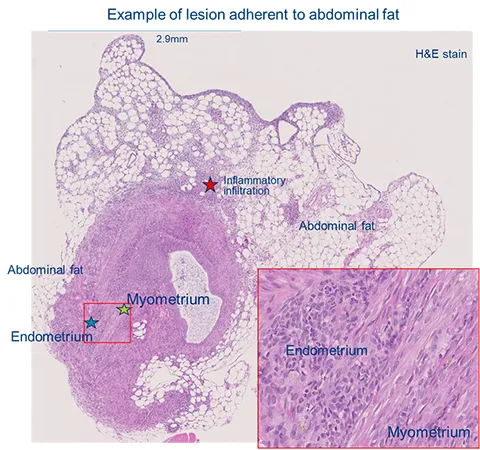


Understanding endometriosis through our validated mouse models
Endometriosis is a common gynecological disorder affecting women of reproductive age. It is estimated to affect around 10% of women globally. Diagnostic tools are currently insufficient, with laparoscopic surgery being the only method able to provide a reliable diagnosis. Imaging tools such as MRI are still unable to systematically confirm the presence or absence of lesions, and the accuracy of the diagnosis is highly dependent on the expertise of the radiologist. Preclinical endometriosis mouse models play an important role for the identification of imaging tracers and blood tests able to detect and trest endometriosis.
Robust preclinical endometriosis models for drug discovery
Developing these new diagnostic and therapeutic tools for endometriosis involves the use of in vivo models reproducting the mechanisms of the disease.
Oncodesign Services provides several standard translational mouse models addressing a variety of inflammation diseases, including endometriosis, and provides CRO support for de novo development of new therapies.
Choosing the right endometriosis mouse model for your drug discovery
Introduction to endometriosis
Endometriosis is a complex and often painful medical condition in which tissue similar to the lining of the uterus grows outside the uterus. These are two medical challenges in the field of endometriosis: developing non-invasive sensitive and specific diagnostic tools, and developing treatments alleviating symptoms in patients.
Endometriosis is often associated with chronic pelvic pain, dysmenorrhea (painful menstruation), and pain during intercourse. Besides, approximately 30-50% of women with endometriosis may experience infertility due to the impact on the reproductive organs. Furthermore, endometrial tissue can cause adhesions and scarring in the pelvic region, leading to organ dysfunction and pain.
Endometriosis imposes significant healthcare costs, including diagnosis, treatment, and management of associated complications. Women with endometriosis may experience reduced work productivity due to symptoms such as pain and fatigue. Finally, this condition can affect daily functioning, leading to a decrease in the overall quality of life for those affected.
Currenlty, no effective treatment exists for endometriosis. Patients care relies mostly on symptom alleviation, with painkillers and hormonal drugs. Surgery remains the solution of choice in the presence of invasive lesions.
Endometriosis mouse models: a complex way to mimic the reality
Preclinical research often involves the use of animal models, such as rodents (mice and rats) and non-human primates. In the context of treatment development, they are used to assess the safety, efficacy, and pharmacokinetics of potential therapeutic agents, including hormonal therapies, anti-inflammatory drugs, and targeted therapies. They can also be used to test the accuracy of diagnostic tools such as blood tests.
Mice are commonly used due to their genetic tractability and relatively low cost. Model of choice consists of inducing endometriosis-like lesions by injecting endometrial fragments or cells into the peritoneal cavity of mice. The severity of the inflammation of the lesions can be aggravated by substance P addition, for instance.

Our typical readouts for endometriosis models
Pain monitoring
Behavioral tests
Lesion size, weight and number
Gene expression
Fibrosis quantification
Inflammatory cell infiltration quantification
Peritoneal lavage fluid cell populations identification (FACS)
Discover Oncodesign Services’ preclinical mouse models of endometriosis
Oncodesign Services offers CRO services for several preclinical models addressing a variety of inflammatory, fibrotic and auto-immune pathologies, and provides support for the de novo development of new models recently described in the literature.
Using this combined expertise, we are currently developing endometriosis rodent models to support our clients in the development of treatment solutions.


